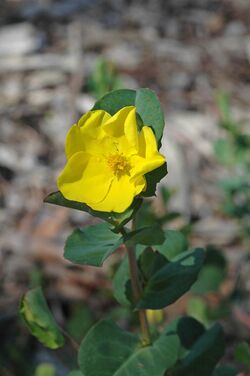Biology:Hibbertia porongurupensis
| Hibbertia porongurupensis | |
|---|---|

| |
| Scientific classification | |
| Kingdom: | Plantae |
| Clade: | Tracheophytes |
| Clade: | Angiosperms |
| Clade: | Eudicots |
| Order: | Dilleniales |
| Family: | Dilleniaceae |
| Genus: | Hibbertia |
| Species: | H. porongurupensis
|
| Binomial name | |
| Hibbertia porongurupensis J.R.Wheeler & Hoogland[1]
| |
Hibbertia porongurupensis is a species of flowering plant in the family Dilleniaceae and is endemic to a restricted area of the south-west of Western Australia. It is a glabrous shrub with broadly elliptic to more or less round leaves and yellow flowers arranged singly in leaf axils with large numbers of stamens arranged around five carpels.
Description
Hibbertia porongurupensis is an erect, glabrous shrub that typically grows to a height of up to 2 m (6 ft 7 in) with flattened, slightly winged stems. Its leaves are arranged alternately along the branches, broadly elliptic to more or less round, 12–55 mm (0.47–2.17 in) long, wide and sessile, with the base wrapped around the stem. The flowers are arranged singly in leaf axils on a peduncle 15–30 mm (0.59–1.18 in) long with a single oblong bract 7–10 mm (0.28–0.39 in) long at the base. The five sepals are 10–15 mm (0.39–0.59 in) long and joined at the base, the inner sepals narrower than the outer ones. The five petals are yellow, broadly egg-shaped with the narrower end towards the base and 10–20 mm (0.39–0.79 in) long with a notch at the tip. There are many stamens and sometimes a few staminodes arranged in a ring around the five glabrous carpels, each with three to five ovules. Flowering occurs from September to October.[2][3]
Taxonomy
Hibbertia porongurupensis was first formally described in 2000 by Judith R. Wheeler and Ruurd Dirk Hoogland in the journal Nuytsia from specimens collected by Hoogland at the base of the Devil's Slide in the Porongurup Range in 1971.[2][4] The specific epithet (porongurupensis) refers to the type location.[2]
Distribution and habitat
The hibbertia grows in rock crevices and on rock outcrops, restricted to the upper slopes of the Porongurup Range.[3][2]
Conservation status
Hibbertia porongurupensis is classified as "Priority Four" by the Government of Western Australia Department of Parks and Wildlife,[3] meaning that is rare or near threatened.[5]
See also
References
- ↑ "Hibbertia porongurupensis". Australian Plant Census. https://biodiversity.org.au/nsl/services/apc-format/display/173622.
- ↑ Jump up to: 2.0 2.1 2.2 2.3 Wheeler, Judith R.; Hoogland, Ruurd D. (2000). "Hibbertia porongurupensis, a new name for a species of Dilleniaceae endemic to the Porongurup Range.". Nuytsia 13 (2): 395–398. https://www.biodiversitylibrary.org/item/225408#page/137/mode/1up. Retrieved 24 August 2021.
- ↑ Jump up to: 3.0 3.1 3.2 "Hibbertia porongurupensis". FloraBase. Western Australian Government Department of Parks and Wildlife. https://florabase.dpaw.wa.gov.au/browse/profile/19445.
- ↑ "Hibbertia porongurupensis". APNI. http://id.biodiversity.org.au/instance/apni/574500.
- ↑ "Conservation codes for Western Australian Flora and Fauna". Government of Western Australia Department of Parks and Wildlife. https://www.dpaw.wa.gov.au/images/documents/plants-animals/threatened-species/Listings/Conservation%20code%20definitions.pdf. Retrieved 24 August 2015.
Wikidata ☰ Q17395380 entry
 |


